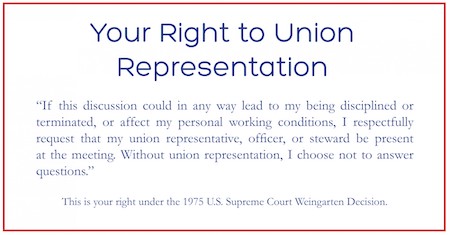Due Process
 We've all heard the myth that tenure means "a job for life." This is demonstrably false, and the FA has long fought to protect our members' due process rights and the right to earn continuing appointment.
We've all heard the myth that tenure means "a job for life." This is demonstrably false, and the FA has long fought to protect our members' due process rights and the right to earn continuing appointment.
Due process refers to the protection our members have to a fair hearing if they have been accused of wrongdoing, misconduct, or incompetence on the job. Your due process is afforded to you in any situation where a supervisor or administrator calls you into a meeting where you feel you might be at risk of disciplinary action or termination. In such a case, exercise your Weingarten rights to pause the meeting and call for an FA reprsentative to be present. You can simply say the following:
If this discussion could in any way lead to my being disciplined or terminated, or affect my personal working conditions, I respectfully request that my union representative or an FA officer be present at the meeting. Without union representation, I choose not to answer questions."
Due process should not be controversial. It is the same principle that underlies our entire criminal justice system: Individuals are presumed innocent until proven guilty. That's all that due process means.
While some would have us believe that due process and tenure are somehow bad for education, these fundamental rights protect educators from being unfairly fired, such as in case an administration decides they dislike the way a professor teaches their subject matter or in case an administration thinks firing the most senior/highest paid faculty would be a convenient way to save some money.
In testimony before the State Senate education committee, NYSUT President Andy Pallotta explains:
Tenure is also the first line of defense against attacks on academic freedom at every level of education. Absent tenure, teachers would be reluctant to engage their students in a free exchange of ideas for fear of arbitrary dismissal. Tenure thus protects academic freedom the way the First Amendment protects freedom of the press.
Tenure, and due process protection for tenured educators, is the norm not only in New York, but across the country. According to a recent survey by the National Education Association, 47 of the 50 states provide some measure of due process protection to tenured educators. Moreover, most civil servants in New York, together with many private sector employees who are protected by collective bargaining agreements, have due process protection before they can be disciplined or discharged from their employment.
There are numerous examples of teachers who, without the protection of tenure, have been improperly discharged from their employment for the most outrageous reasons, such as because they spoke out when the school failed to discipline violent students; for challenging discrimination against disabled students; and for reporting dangerous conditions in the school building. ...Tenure is not, however, the guarantee of a "job for life." Tenured educators can be dismissed for just cause, including incompetency or misconduct. The due process protections set forth by the Legislature under Section 3020-a are designed to ensure that educators, once having passed probation and been appointed tenure, cannot be disciplined or discharged from their employment without just cause after a truly fair, due process hearing.
In the FA, Article VII.A.3 addresses continuing appointment for full-time faculty, and adjunct due process is addressed on page 46.








